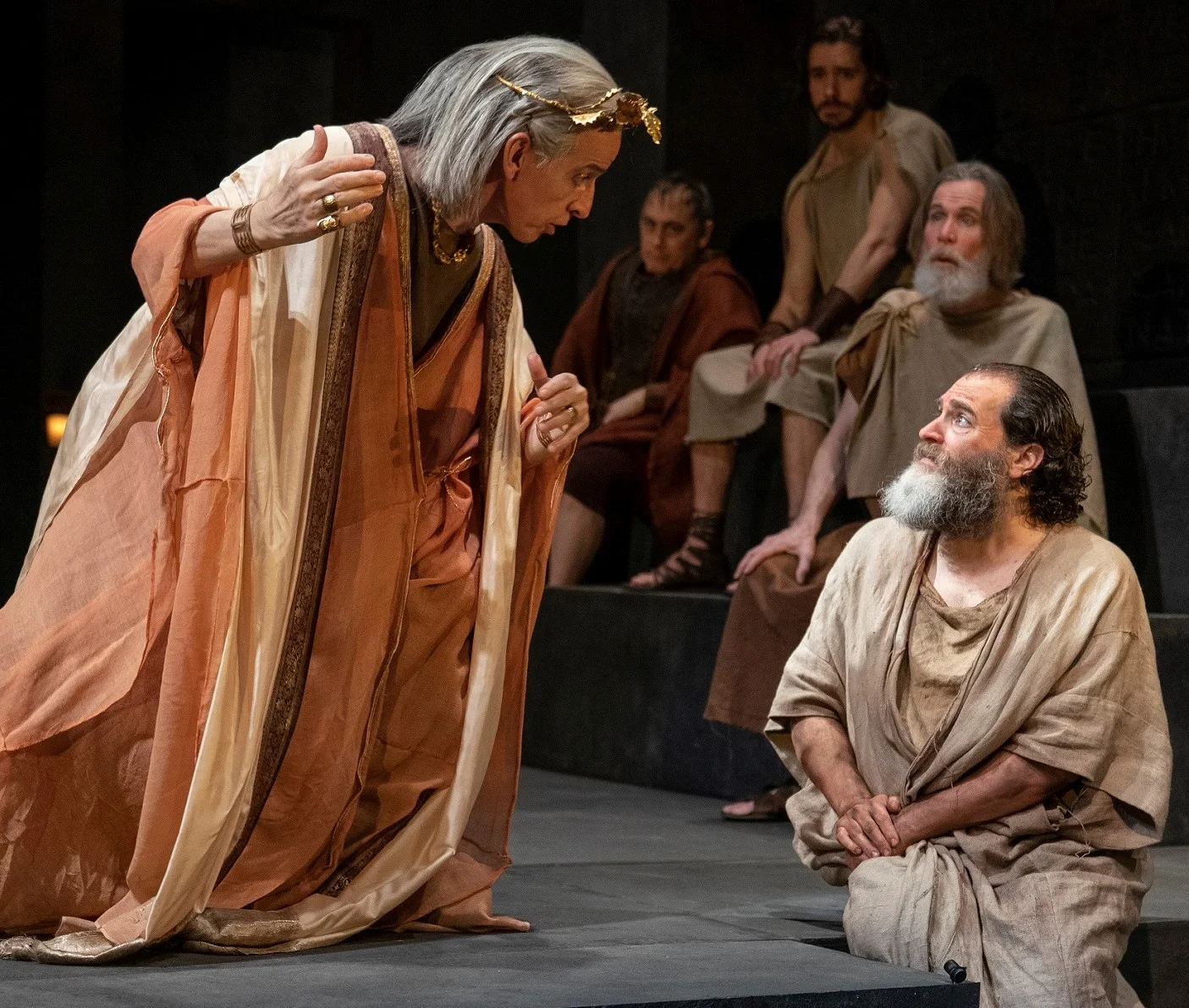Socrates begins at the end, with the famed philosopher already dead, and Plato, his most famous student, trying to understand why. Giving away the ending is always risky, but in playwright Tim Blake Nelson’s hands, the story becomes a type of metaphysical puzzle. The question isn’t who did it—Plato tells us up front it was the city of Athens—but how a supposedly great civilization could so easily eradicate a great mind, especially one who went to great lengths to disavow his greatness. There’s more than a hint of the Christ in the play’s portrayal of Socrates, but the gospel being preached isn’t one of peace and forgiveness, but reason and democracy.
Michael Stuhlbarg (center) is Socrates and Joe Tapper (right) is Agathon, with Ro Boddie (left) looking on, in Tim Blake Nelson’s Socrates. Top: Stuhlbarg with Robert Joy.
The play is part of the Public’s Onassis Festival, exploring the roots and future of democracy. There’s a loose, roughly chronological narrative, which finds Socrates, a war veteran advanced in years, debating his band of fervent followers while largely ignoring his wife and children.
In the title role, Michael Stuhlbarg is electric, displaying little of the nebbish that has been his stock-in-trade in films such as A Serious Man and Call Me by Your Name. He’s nigh unrecognizable in Socrates’ salt-and-pepper beard and shabby robes, the first of many signs of his outsider status in an Athens that values conformity and proper obeisance above all.
Nelson’s play is fueled more by idea than narrative, staging Socrates’ single-minded pursuit of the truth through intricate debates with everyone around him. As the character himself says, “I question falsehood in any form, and the presumption of knowledge where there is none.” The best of these Socratic debates concerns virtue, which is as impossible to define for Socrates as shape and color. Though the play treats Socrates like a Christ figure, though, he is no cardboard saint. Stuhlbarg has such a winning presence that it is easy to be on Socrates’ side, but the more he prods and questions and harangues, the easier it becomes to see why the city would want to be rid of him. This is Nelson’s canniest rhetorical move, to imply just how inimical democracy is and has always been to rigorous interrogation, since its infancy. The long-gestating play—Nelson first took a stab at the material 30 years ago in drama school—is long on ideas, and also just plain long. If Socrates’ three-hour running time could (and should) have easily been cut by at least half an hour, it at least creates space to chew on the heady notions of truth, wisdom, knowledge, and beauty that ping-pong around the stage.
Stuhlbarg with Austin Smith as Alcibiades. Photographs by Joan Marcus.
Even though Socrates addresses the audience directly as the jurors in his trial for “maliciously incoherent” charges of both being an atheist and worshipping false gods (figure that one out if you can), the play is largely free of emotion. During the overlong opening scene, taken from Plato’s Symposium, in which Alcibiades (Austin Smith) recounts a failed seduction of Socrates years earlier, the supporting characters hoot and holler with such bluster that there’s no need for the audience to join in. This frustrating dynamic plays out throughout the entire play, right up to Socrates’ death, and is largely the result of Doug Hughes’s bombastic direction, perhaps a result of the fear that audiences would not accept lengthy platitudinizing if it weren’t accompanied by constant shouting.
The play’s most affecting moment is one of its only quiet ones, when Xanthippe (Miriam A. Hyman), Socrates’ wife, washes his back, Mary Magdalene–like, before his execution. The moment is sadly undercut by a protracted scene that follows Socrates from the ingestion of poison—accompanied by the cast’s crocodile tears, naturally—all the way to his spasmodic death, an ending that Socrates, at least as presented here, would have hated.
One of Socrates’ most provocative ideas is that words and paintings make people less curious in their pursuit of knowledge since they provide mere illusion and not the real thing, however unapproachable that may ultimately be. The character’s melodramatic death scene is the very thing he has spent the play railing against, a pretense of wisdom standing in for anything like actual understanding. It’s a shame, because Nelson’s thrilling, incisive play has wisdom to burn, in all matters except the one that matters most: the human.
Socrates runs through June 2 at the Public Theater (425 Lafayette St.). Evening performances are at 7:30 p.m. Tuesday through Sunday; matinees are at 1:30 p.m. Saturday and Sunday. For tickets and information, call 212-967-7555 or visit publictheater.org.





